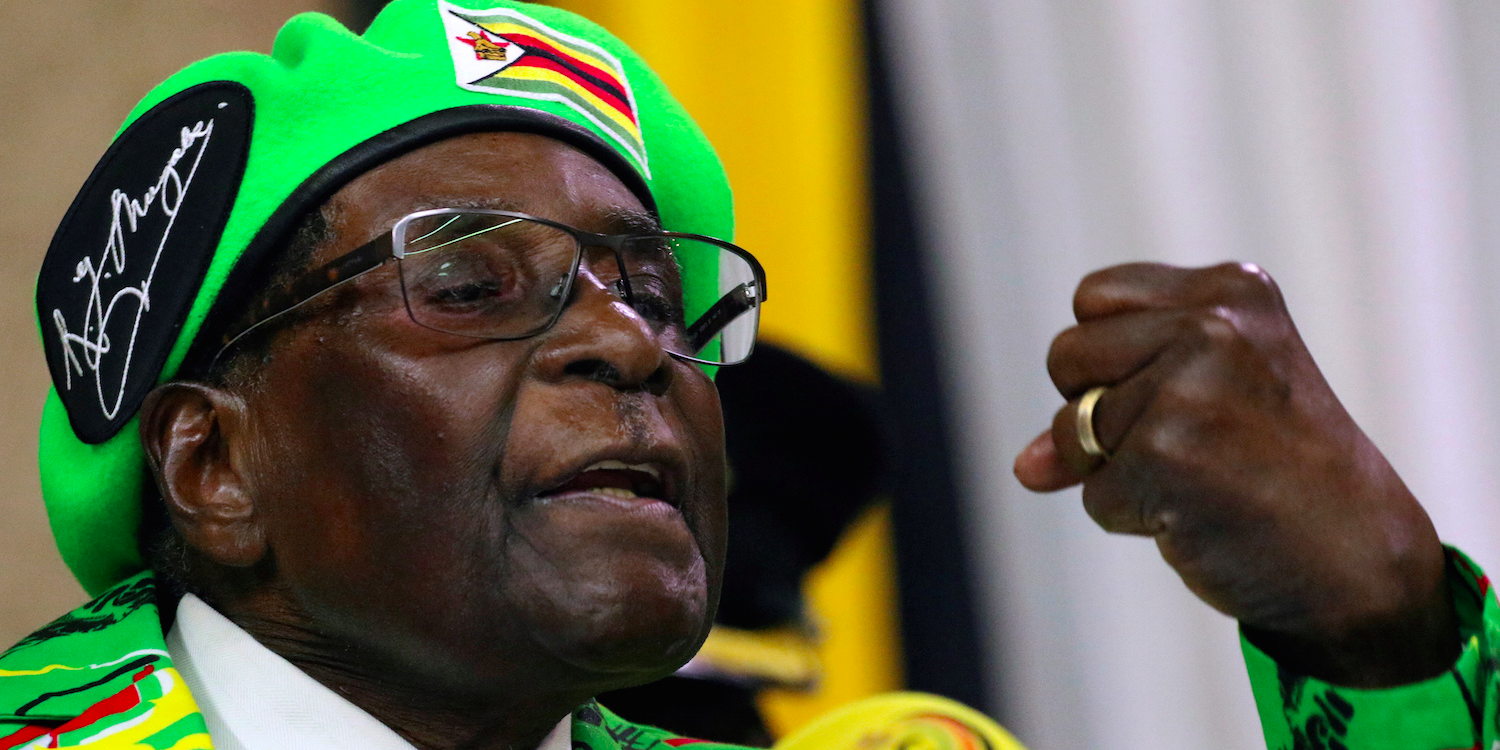Robert Mugabe is the only head of state that Zimbabwe has ever known in its 37-year existence.
He resigned from the presidency on Tuesday.
Mugabe – the longserving president of Zimbabwe – was put under military control in what amounted to a coup ending his authoritarian rule.
On Tuesday, members of parliament in Zimbabwe started impeachment proceedings against Mugabe.
Over the past nearly 40 years, the now 93-year-old Mugabe has gone from an African independence hero to being widely perceived as an authoritarian tyrant.
Here's a look at the life and career of the controversial Zimbabwe leader:
Robert Gabriel Mugabe was born February 21, 1924 in what was then Southern Rhodesia. The territory had been in British control since 1888.

Mugabe was born on a Catholic mission near Harare, now Zimbabwe's capital, and educated by Jesuit priests. He first got work as a primary school teacher.

He moved to South Africa to attend the University of Fort Hare, known at the time as a center of African nationalism.

Mugabe is often compared with South African leader Nelson Mandela, another Fort Hare graduate who went on to lead his country out of white rule. While both men were revolution leaders, critics note the diverging paths they took once in power.

Source: NPR
Returning to Southern Rhodesia, Mugabe became involved in politics. At the time, the country was dominated by white minority rule. Below, a Rhodesian government soldier holds African villagers at gunpoint in 1977, as they're interrogated about anti-government guerrilla activity.

Perhaps the embodiment of white minority rule was Ian Smith, below on the right. Named prime minister of Southern Rhodesia in 1964, Smith quickly declared independence from Britain in 1965, naming the country Rhodesia. "The white man is master of Rhodesia. He has built it, and he intends to keep it," Smith said.

Smith ruled over Rhodesia until 1980. He said in 1966 that "The white man is master of Rhodesia" and declared in 1976 that there would be no black majority rule, "not in a thousand years."

Source: The New York Times
Mugabe spent 10 years in jail — from 1964-1974 — for opposing white rule. While in prison, he earned three degrees, adding to four he already had.

Upon his release, he eventually gained leadership of the Zimbabwe African National Liberation Army, which was locked in a brutal civil war with the Smith-led white government. Mugabe became known as the "thinking man's guerrilla," espousing Marxist ideas.

Source: Reuters
At the end of the war, Mugabe was elected Zimbabwe's first black leader in 1980. His party, Zimbabwe African National Union (ZANU), was swept into power. Here he is emerging from parliament following its official opening, alongside his wife Sally.

Mugabe was quickly welcomed on the international stage, speaking at the United Nations General Assembly in 1980 as Zimbabwe became a newly admitted member.

Things started to change as Joshua Nkomo — a former Mugabe ally during their shared fight for an independent country — emerged as Zimbabwe's leading opposition figure. Below are Mugabe, left, and Nkomo, right, as revolutionaries in 1976.

In 1982, Mugabe initiated military action in Matabeleland against perceived uprisings, blamed on Nkomo.

Mugabe sent North Korean-trained army units in to Matabeleland. Mass graves were later discovered — prompting accusations of genocide — and human rights groups estimated that 20,000 people died.

Source: Reuters
His first wife, Sally, seen by many as the only person capable of restraining him, died in 1992.

Source: Reuters
In 1996, Mugabe married his former secretary Grace Marufu, who eventually went on to become almost as controversial as her husband.

Mugabe became president of Zimbabwe in 1990, after serving as the country's prime minister. During the decade, the government took increased control of the economy and land redistribution continued, in an effort to move the country's prosperous white-owned farms to black ownership.

The 1990s also saw some of the first public uprisings against Mugabe, as students and workers took to the streets to protest the seemingly increasingly authoritarian government.

"Officially, Zimbabwe remains a parliamentary democracy, but in reality Mugabe presides over the country as a tyrant in the classical sense of the word: an autocrat who rules exclusively for his own gratification, with contempt for the common good," Philip Gourevitch wrote in a 2002 New Yorker profile.

Source: The New Yorker
The new century saw Zimbabwe's economy crash, shrinking by more than a third from 2000 to 2008. Unemployment skyrocketed to more than 80%.

Source: Reuters
Much of the blame for Zimbabwe's economic woes could be blamed on the land reform programs, which amped up in 2000, as black war veterans violently took over white-owned farms, a move Mugabe supported.

By the end of the decade, Zimbabwe was hit was hyperinflation, abandoning its currency in 2009.

Despite both popular and political pressure, Mugabe refused to give up power. In 2008, Mugabe said "only God" could remove him from office.

Source: The Telegraph
New York Times columnist Nicholas Kristof, writing from Zimbabwe in 2010, reported that many black citizens wanted a return to white rule. "It would have been better if whites had continued to rule because the money would have continued to come," one 58-year-old farmer told Kristof. “It was better under Rhodesia. Then we could get jobs. Things were cheaper in stores. Now we have no money, no food."

Source: The New York Times
Mugabe's age became increasingly apparent as he entered his 90s. A public and well-documented fall in 2015 was confusingly denied by the government.

Source: The Washington Post
As Zimbabwe prepared for general elections in 2018, there were few indications that the country would soon see the likely end of the world's longest serving leader.

Mugabe's rapid downfall started in mid-November, following the expulsion of two consecutive vice-presidents and the rise of Mugabe's wife, Grace.

"Gucci" Grace Mugabe, as she has come to be known for his lavish spending in the face of the country's poverty, had seen her own standing in Zimbabwe's government quickly rise since taking over the ZANU-PF women's league in 2014.

Click here for more on Grace Mugabe.
The Zimbabwe army took to the streets of Harare on November 15, placing the capital and the Mugabe family under military control.

On Sunday, Mugabe was widely expected to announce his resignation — but didn't. Zimbabwe's parliament has now pledged to impeach him if he doesn't leave office.

Mugabe finally announced his resignation on Tuesday.


